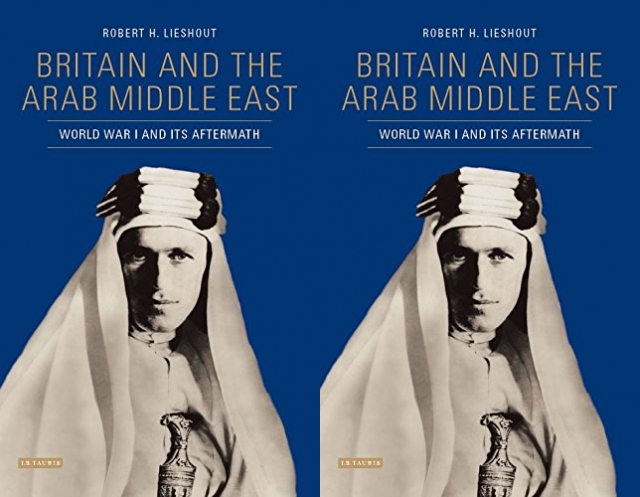Britain and the Arab Middle East
Book Review

World War I and its aftermath
Britain and the Arab Middle East: World War I and its aftermath by Robert H. Lieshout (I.B. Tauris, 2016) 510pp. £29.95, hard, ISBN 978-1-78453-583-4
In the long years since the invasion of Iraq, the short-lived ‘Arab Spring’, the unending civil wars in Syria, the meteoric rise of Islamic State and its spread from Syria and Iraq across the Maghrib to Europe and its impact on the displacement and migration of peoples across the Mediterranean or through the Balkans in search of a new home (or at least a temporary one) in the EU had resulted in a proliferation of historical studies placing this in context. There is a strong case to be made that virtually every time the West has intervened in the Middle East--either as mandated by the League of Nations after 1922, commercially to satisfy the West’s insatiable thirst for oil or its military adventures post-9/11 against Islamic terrorism—it has proved disastrous to Middle Eastern political stability whilst the western desire at regime change replacing dictators with forms of western democracy totally inappropriate to the complex racial, religious and tribal divisions of the area catastrophic. This excellent study of the nuances and misconceptions of the British ‘official mind’ in the Middle East during and immediately after the First World War is evidence of just how important the historical context is and that had politicians known more of the history of the region they might have recognised why mistakes were made in the last and not have made such a mess of it all.
The profound effects of the British Empire’s actions in the Arab World during the First World War can be seen echoing through the history of the twentieth century. The Arab uprising sparked by the Husayn-McMahon correspondence and led by ‘Lawrence of Arabia’; the Sykes-Picot agreement that undermined that rebellion; and memoranda such as the Balfour Declaration all have shaped the Middle East into forms which would have been unrecognisable to the diplomats of the nineteenth century. Undertaken during the First ‘World’ War, these actions were not part of a coordinated British strategy, but in fact directed by several overlapping and competing departments, some imperfectly referred to as the ‘Arab Bureau’. The British and the Middle East is unique in its comprehensive treatment of how and why the British generals and diplomats acted as they did. By taking as his starting point the voluminous, contradictory and revealing records of the policy-makers in the British government, Robert H. Lieshout shows convincingly that many concerned with foreign policy making were quite oblivious to the history and complexities of the Islamic World. Covering the full sweep of British involvement in Arabia, he makes a lasting contribution to understanding how the British Empire tried to change the world and how shallow and confused the understanding of those that shaped the future of the Middle East really was.
Richard Brown

